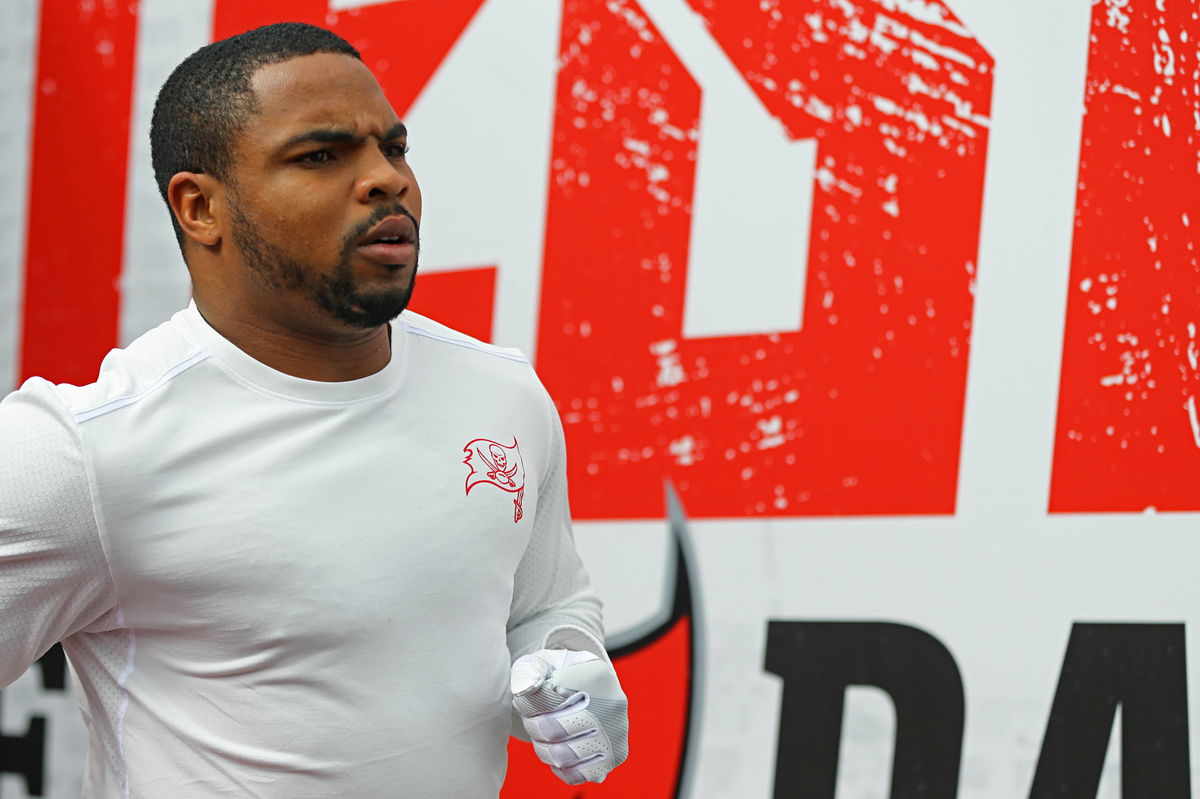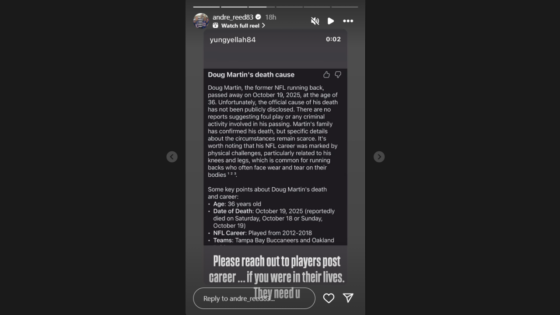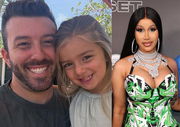
USA Today via Reuters
NFL, American Football Herren, USA New York Jets at Tampa Bay Buccaneers, Nov 12, 2017 Tampa, FL, USA Tampa Bay Buccaneers running back Doug Martin 22 prior to the game against the New York Jets at Raymond James Stadium. Mandatory Credit: Aaron Doster-USA TODAY Sports, 12.11.2017 11:23:00, 10406904, NPStrans, New York Jets, Raymond James Stadium, Doug Martin, Tampa Bay Buccaneers, NFL PUBLICATIONxINxGERxSUIxAUTxONLY Copyright: xAaronxDosterx 10406904

USA Today via Reuters
NFL, American Football Herren, USA New York Jets at Tampa Bay Buccaneers, Nov 12, 2017 Tampa, FL, USA Tampa Bay Buccaneers running back Doug Martin 22 prior to the game against the New York Jets at Raymond James Stadium. Mandatory Credit: Aaron Doster-USA TODAY Sports, 12.11.2017 11:23:00, 10406904, NPStrans, New York Jets, Raymond James Stadium, Doug Martin, Tampa Bay Buccaneers, NFL PUBLICATIONxINxGERxSUIxAUTxONLY Copyright: xAaronxDosterx 10406904
Former Tampa Bay Buccaneers All-Pro running back Doug Martin passed away at the age of 36 after an incident in Oakland, California, where he died while in police custody. While the official cause of his death remains unconfirmed and is under investigation, the statements from his family offered a painful clarity: Martin was struggling with a profound mental health crisis.
Watch What’s Trending Now!
Hall of Fame receiver Andre Reed, the legendary Buffalo Bills star, recently used his social media platform to shine a light on the crisis. In a poignant thread of stories, Reed shared his raw feelings:
“Mental health of our players… hurts man. Need people who actually care about us, outside of making money off of players’ contracts. Sometimes I feel like agents ditch you when you stop playing… kinda makes you feel like more of an object than a human. That’s why @theresa_vpr & I are trying to support players differently. With depth beyond…show them how to find more purpose. Community outside the game.”
ADVERTISEMENT

Imago
andre reed (Image via Instagram @andre_reed83)
Martin’s agent released a statement on behalf of the family, explaining that his parents had been actively seeking medical assistance for him and had contacted local authorities for support. This specific detail reignited a public discussion about the support, or lack thereof, provided to former players.
Being a professional athlete or public figure means existing in a space where value is often tied directly to performance. When an athlete hangs up their cleats, the perceived value they once had is instantly gone. The public moves on, and worse, the organizations and agents who made huge profits off their contracts often drop them completely. This painful, transactional reality is an epidemic in the National Football League, where reports show a stunning 78% of players face bankruptcy or crippling financial distress within just a few years of retirement.
ADVERTISEMENT
The issues, however, extend far beyond the bank account. The mental and physical toll of the game catches up quickly. While players receive treatment for immediate physical injuries during their careers, these problems frequently resurface later in life, causing chronic pain and daily inconvenience, all without the support structure they once enjoyed. The transition from a high-stakes, highly structured career to retirement can be devastating to a player’s mental well-being.
Reed has asked the fans to show their love and support when it actually matters.
ADVERTISEMENT
Doug Martin’s family opens up
The recent and heartbreaking death of former NFL star Doug Martin at the age of 36 has cast a tragic, human light on the struggles faced by athletes long after they leave the gridiron. Martin, a celebrated two-time Pro Bowl running back, built a remarkable college career at Boise State, where he amassed over 3,400 rushing yards and 43 touchdowns before becoming a first-round pick for the Tampa Bay Buccaneers in the 2012 NFL Draft.
However, the circumstances of his passing in Oakland, California, reveal a private battle that ultimately overshadowed his public achievements. Martin died while in police custody after an incident involving a break-in. In a moving statement released Monday night, Martin’s family provided painful clarity, asking for understanding of the severe mental health crisis he was facing.
ADVERTISEMENT
The family explained that Martin had been privately dealing with mental health issues that profoundly impacted his life. Talking about what had exactly taken place, they told, in a moment of disorientation and distress, the events unfolded tragically: “Feeling overwhelmed and disoriented, Doug fled his home during the night and entered a neighbor’s residence two doors down, where he was taken into custody by police.”
Top Stories
Josh Allen’s Strong Stance on Sean McDermott’s Exit Revealed After Owner Shared Bills QB’s Role in HC’s Firing

John Harbaugh Fires Giants Coach Battling Cancer as Ravens Block Staff Poaching

Bills Announce Concerning Josh Allen News as Owner Unloads on NFL Refs For Brandin Cooks Incident

Viral 4-Year-Old NFL Picks Girl Faces Death Threats After Cardi B’s Profanity-Laced Rant

‘Desperate’ to Find Help, Cowboys Legend Troy Aikman Shares Medical Update on Chronic Issue

According to the Oakland Police Department, the attempt to detain Martin involved a brief struggle, after which he became unresponsive. Paramedics were called to the scene and transported Doug Martin to a local hospital, where he later died.
The full details of what transpired during his detention remain under investigation.
ADVERTISEMENT
ADVERTISEMENT
ADVERTISEMENT
ADVERTISEMENT



